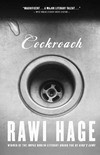
Cockroach
Rawi Hage
House of Anansi Press
$29.95
cloth
305pp
978-0-88784-209-2
Hage’s second novel, Cockroach, which was recently nominated for the Giller Prize and the Governor General’s Literary Award, is hustled along by the furtive energy of arrival, and by the immigrant’s laboured, disquieting uncocooning: unravelling memories, and so many stories.
An Arab narrator has landed in psychoanalysis with Genevieve, a tepid Québécoise whose task it is to understand and cure her patient – at least cure him sufficiently that he will renounce his suicide attempts and fall into a semblance of social order.
But it’s not easy to metamorphose from a past daubed with torture, extortion, rape, larceny, hunger, and political oppression into a society that privileges privacy, material success, and obedience. Our narrator, a photophobe who spends the story’s cold winter weeks with his curtains drawn and scarf pulled tight, likes “dark passages that lead to where everything comes from.” The origin of a creature seems clearer when man or beast comes from the underground – whether the literal pipes and cracks, the figurative overlooked immigrant community, or the magic-realist invasions of the narrator. In fact the man in question feels more simpatico with the beasts that crawl from his drain or skitter under his refrigerator, apparently indestructible.
Cockroached both by his own indolence and by his adoptive country, the man slips into the lives of Montreal’s insipid bourgeoisie, breaks into the apartment of his increasingly creeped-out therapist, and inches towards the virtue of his boss’s adolescent daughter. Yet once he’s in – feeding lousy cocaine to yuppies taken by his exoticism, stealing Genevieve’s slippers, or faced with the de-pantied daughter – he cannot manage to keep hold of anything. Actual movement tends to be sparked by others, from the tragically botched rescue of his sister, to the unexpectedly bloody climax as he helps avenge Shoreh, his lover.
The plot, which slogs through personal context and history in the therapy scenes, is jump-started when Shoreh and her subplot surface. Whereas Hage elsewhere swings between the delicate roller-coaster poetry of his first book and clipped observations of the quotidian, the narrator’s scenes with the characters he actually likes and trusts are disarmingly honest. When Shoreh tells him the story of her survivals, his reaction is understated, pragmatic, and quietly bereft. “I need to be alone, she whispered, and she cried and turned her head away because she couldn’t face my sleepy eyes … my interrupted nightmares.” The narrator bawls against those interruptions, seeks nightmares and apocalypses. “Mon cher,” his erstwhile cockroach interlocutor points out, “The world ended for you a long time ago.”
Humans are touching, moving in their rare moments of honesty, and, in counterpoint to his stubbornly fractious narrator, Hage segues instinctively in and out of that honesty. Shoreh’s would-be godfather and her friend Farhoud act as still points between the demands of existence and reflection on existence. When Farhoud delivers the narrator from the cold with soup, wine, and more relentless stories of extortion, torture, and homophobia, the narrator offers to avenge those wrongs too. “What score?” Farhoud asks. “Do you know how many scores there are to settle in my life? Do you? Do you?” They both fall silent, “remembering the red of the wine, the white of the snow, and that night was on its way.”
After night comes dawn, and spring after even the worst of Montreal winters, but beneath the continuum of hope the Western world sells itself, there is a discomfitting unhomeliness, and latent violence, and hair-triggered ferocious condemnations of bad faith that slither through, never wholly unremarked and now, with Hage’s Cockroach, forcibly remarkable. mRb






0 Comments